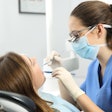In a settlement reached with the U.S. Federal Trade Commission (FTC), Brain-Pad and its president, Joseph Manzo, have been barred from making unsupported claims that the company's mouthguards reduce the risk of concussions from lower jaw impacts, reduce the risk of concussions generally, or have been clinically proven to do either.
The settlement also prohibits Brain-Pad and Manzo from misrepresenting the health benefits of any mouthguard or other athletic equipment designed to protect the brain from injury.
According to the FTC, Brain-Pad and Manzo made their claims about the mouthguards' concussion-protecting qualities on product packaging and in Internet and print advertisements. On packaging for the Brain-Pad Pro-Plus Junior mouthguard, the defendants claimed the device "creates new brain safety space!" and "Reduces Risk of Concussions! From Lower Jaw Impacts."
Similarly, packaging for the adult-size Brain-Pad Double Mouth Guard proclaims that the device, "Reduces risk of CONCUSSIONS! Protects Upper AND Lower Teeth!"
Mouthguards can help to shield a person's teeth from being injured, and some can reduce impact to the lower jaw, according to David Vladeck, director of the FTC's Bureau of Consumer Protection. "But it's a big leap to say these devices can also reduce the risk of concussions," he stated in an FTC press release. "The scientific evidence to make that claim just isn't adequate."
The FTC will publish a description of the consent agreement package in the Federal Register. The settlement agreement will be subject to public comment for 30 days, August 16 through September 17, 2012, after which the FTC will decide whether to make the proposed consent order final. Interested parties can submit written comments electronically or in paper form.


















